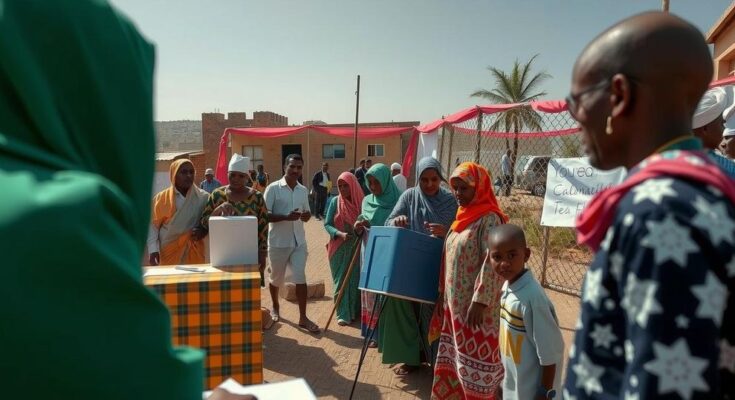Voting is underway for Somaliland’s presidential elections, delayed for two years, with over one million expected voters participating at more than 2,000 polling stations. Incumbent President Muse Bihi Abdi seeks re-election amid political tensions and aspirations for economic reform. Key opposition candidates are advocating for democratic reforms and national unity. The elections are pivotal for the region’s stability and international recognition.
On November 13, 2024, Somaliland commenced its crucial presidential elections after a two-year delay, amid political tensions in the Horn of Africa. Voting took place across more than 2,000 polling stations, with over one million registered voters participating. Amid the anticipation, many citizens expressed a desire for economic improvements and job creation. Notably, incumbent President Muse Bihi Abdi of the Kulmiye Party is vying for a second term, contending against Abdirahman Mohamed Abdullahi of the Waddani Party, who focuses on democratic reforms, and Faisal Ali Warabe from the Justice and Welfare Party, advocating for national unity. Somaliland declared independence from Somalia in 1991 but has not received international recognition, maintaining its own governance systems, currency, and security framework. The region has enjoyed relative stability compared to Somalia, which continues to grapple with insecurity. Despite this stability, Somaliland faced economic challenges that contributed to the electoral delay announced in 2022. Tensions with Somalia have escalated following Somaliland’s recent agreement with Ethiopia for direct access to the Indian Ocean, prompting Somalia to accuse Ethiopia of violating its territorial integrity. This election marks Somaliland’s fourth presidential election, raising concerns regarding the robustness and reliability of its electoral process.
The ongoing presidential elections in Somaliland highlight the region’s unique political situation within the Horn of Africa. Since its declaration of independence from Somalia in 1991, Somaliland has established a functioning government and political system, differentiating itself from the instability often present in Somalia. Despite lacking formal international recognition, Somaliland has managed to create a fairly stable political environment and is now reflecting on issues such as economic development and democratic processes, as evidenced by the recent presidential campaigns.
In summary, the presidential election in Somaliland is a significant milestone for the region, reflecting both the aspirations of its people as well as the challenges they face. With the participation of over one million voters and major candidates advocating for diverse platforms ranging from economic stability to national unity, these elections may serve as a critical juncture in Somaliland’s pursuit of recognition and governance. The political backdrop, including regional dynamics and internal tensions, underscores the importance of this electoral process for the future of Somaliland.
Original Source: apnews.com




